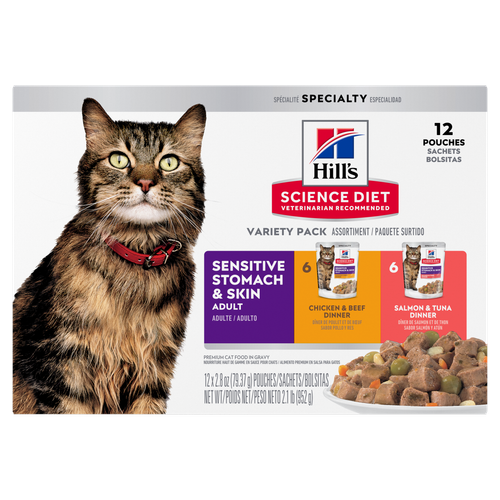
-
Find the right food for your petTake this quiz to see which food may be the best for your furry friend.Find the right food for your petTake this quiz to see which food may be the best for your furry friend.Health CategoryFeatured products
 Adult 7+ Small & Mini Chicken & Brown Rice Recipe Dog Food
Adult 7+ Small & Mini Chicken & Brown Rice Recipe Dog FoodFor the unique nutritional needs of mature Small & Mini dogs
Shop Now Adult Small Bites Chicken & Barley Recipe Dog Food
Adult Small Bites Chicken & Barley Recipe Dog FoodSupports lean muscle for dogs who prefer smaller kibble
Shop Now Adult Small & Mini Chicken & Brown Rice Recipe Dog Food
Adult Small & Mini Chicken & Brown Rice Recipe Dog FoodFor the faster metabolism of Small & Mini dogs
Shop NowFeatured products Sensitive Stomach & Skin Chicken & Beef Dinner
Sensitive Stomach & Skin Chicken & Beef DinnerGourmet daily nutrition, carefully made. Tasty chunks with chicken & beef in a decadent gravy. Supports digestive health, nourishes skin and promotes a lustrous fur.
Shop Now Adult Perfect Weight Salmon & Vegetable
Adult Perfect Weight Salmon & VegetableOver 70% of cats lost weight within 10 weeks when fed this nutrition
Shop Now Adult Sensitive Stomach & Skin Pouch Variety Pack Cat Food, Chicken & Beef, Salmon & Tuna
Adult Sensitive Stomach & Skin Pouch Variety Pack Cat Food, Chicken & Beef, Salmon & TunaCarefully made, gourmet daily nutrition. Tasty chunks with Salmon & Tuna in a decadent gravy. Supports digestive health, nourishes skin and promotes a lustrous fur.
Shop Now -
DogCat
- Cat Tips & Articles
-
Health Category
- Weight
- Skin & Food Sensitivities
- Urinary
- Digestive
- Kidney
- Dental
- Serious Illness
-
Life Stage
- Kitten Nutrition
- Adult Nutrition
Featured articles The Right Diet For Your Pet
The Right Diet For Your PetLearn what to look for in healthy pet food & nutrition, including ingredients, quality of the manufacturer, your pet's age, and any special needs they have.
Read More Pet Food Storage Tips
Pet Food Storage TipsWhere you store your cat and dog food can make a big difference in the quality and freshness once it is opened. Here are some common questions and recommendations for optimal storage for all of Hill’s dry and canned cat and dog food.
Read More Water
WaterWater is the most important nutrient of all and essential for life. Animals can lose almost all their fat and half their protein and still survive, but if they lose 15% of their water, it will mean death.
Read More -
Hill’s Disaster Relief Network: Helping Pets in Need
Hill’s Disaster Relief Network: Helping Pets in Need
All too often, pets become silent victims when disasters strike. Fire, flood, and earthquakes can leave local shelters inundated with dozens of pets that get displaced from their homes.
We believe every pet deserves to live their best life, which is why we partner with Good360 as part of our Hill’s Disaster Relief Network. The network is part of our Food, Shelter & Love program. In Australia, since 1997, the Hill’s Food, Shelter & Love Program has provided local shelters with the life-changing nutrition they need to help homeless pets find forever homes.
Over the years the Network has....
Supported shelters, vet clinics and other nonprofits caring for pets
Donated pet food
Responded to national disasters including floods and fires
Over the years the Network has....
Supported shelters, vet clinics and other nonprofits caring for pets
Donated pet food
Responded to national disasters including floods and fires
No matter the disaster, every paw can use a helping hand
We support shelters, veterinary clinics and nonprofits in all types of natural disasters to ensure that pets and shelter animals are cared for. Here are some recent natural disasters we’ve helped address locally and globally.

Australian Bushfires, 2020

Nashville Tornadoes, 2020

Hurricane Ida, 2021

Brisbane, 2010-11

Hawaii

Mexico

Japan

Global
No matter the disaster, every paw can use a helping hand
We support shelters, veterinary clinics and nonprofits in all types of natural disasters to ensure that pets and shelter animals are cared for. Here are some recent natural disasters we’ve helped address locally and globally.

Australian Bushfires, 2020

Nashville Tornadoes, 2020

Hurricane Ida, 2021

Brisbane, 2010-11

Hawaii

Mexico

Japan

Global
Frequently asked questions
Right now! A few preparations today can make a world of difference in the future – especially when it comes to your dog or cat. Rather than suffer the stress of scrambling to help your pet at the last minute, the best decisions in an emergency are made before it even happens.
Disasters often strike without warning. That’s why we’re spreading the message for pet families to be prepared. Planning ahead is the best way for families to ensure that all members of their family, including pets, are ready to face an emergency.
Many preparedness tips are relevant to any type of disaster, but you may have additional considerations based on where you live. Think about the most logical scenarios that could happen around your area and the different ways people in your community might respond.
Pet parents should immediately contact a local veterinarian or pet shelter if a pet is injured. While a veterinarian should be the first point of contact, local shelters often become hubs for animal care during a disaster and will likely have veterinarians on-site to help treat injured pets.
Beyond our role as a pet food company, we believe in helping pets live their best lives any way we can. While our expertise is creating science-based pet nutrition, we also support the pets and people impacted by a disaster, and we are grateful to partner with shelters, veterinary hospitals and nonprofits to ensure that pets and shelter animals are fed and cared for. The network is part of our Food, Shelter & Love program. In Australia, since 1997, the Hill’s Food, Shelter & Love Program has provided local shelters with the life-changing nutrition they need to help homeless pets find forever homes.
Is your pet ready for an emergency?
No one wants to think about a disaster, but the proper precautions can keep your pet safe and add peace of mind to your everyday life. Check out our page with helpful resources to prepare you and your pet.
Is your pet ready for an emergency?
No one wants to think about a disaster, but the proper precautions can keep your pet safe and add peace of mind to your everyday life. Check out our page with helpful resources to prepare you and your pet.

